伊丽莎白性格
《傲慢与偏见》中伊丽莎白人物性格分析

《傲慢与偏见》中伊丽莎白人物性格分析伊丽莎白是一个聪慧、坦率、思维敏捷、风趣活泼而有教养的小姐。
她的爱情是从在麦里屯碰到民兵自卫团的军官韦翰开始的,伊丽莎白立刻被韦翰一副"讨人喜欢"的仪表迷住了。
韦翰跟她一见如故,滔滔不绝地表白自己中伤达西先生说道:"老实说,除了在尼日斐花园以外,我到附近任何人家去都会这样说。
哈福德郡根本就没有人喜欢他,他那副傲慢的气派哪一个见了都讨厌。
你绝不会听到人家说他一句好话。
"这些话破绽百出但聪明过人的伊丽莎白竟然毫无察觉,被韦翰牵着鼻子走完全被爱情冲昏了头脑。
她为他抱屈,心里责怪达西,"怎么竞如此对待像你这样的一个青年,光凭你一副脸蛋儿人家准知道你是个和蔼可亲的人"。
她与韦翰分手时"脑子里只想到他一个人"。
总之,优秀的伊丽莎白现在成了被人嘲讽的"愚蠢人"了。
这正是恋爱中的伊丽莎白的真实写照。
由于听信了丰翰的谗言,加之伊丽莎白获悉促使姐姐吉英和彬格莱先生分离的主使人竟是达西,对达西的愤恨和对吉英幸福不可得的心痛完全控制了伊丽莎白的头脑她断定是达西的门户偏见和想把自己妹妹许配给彬格莱先生的自私想法导致了吉英和彬格莱先生分手。
她深恶痛觉地指责达西毁了自己姐姐一生的幸福,剥夺了韦翰幸福生活的权利。
达西的傲慢基于他不屈不挠的性格,由于他出言伤害伊丽莎白,引起她的偏见;也正由于伊丽莎白的自爱才产生了她对达西的偏见,傲慢与偏见都达到了最高峰。
达西给伊丽莎白的一封信促使伊丽莎白的思想发生了重大变化。
达西在信中坦承了自己之所以拆散吉英和彬格莱是因为他误认为吉英对彬格莱并无真爱;而韦翰的所作所为又是那么地令人不齿,甚至想诱使达西的妹妹和他一起私奔。
这信件在伊丽莎白心中宛如一枚重型炸弹,炸毁了她先前心中的种种障碍和芥蒂。
伊丽莎白重新认真、冷静地审视了自己,第一次意识到"自己以往未免太盲目,太偏心,对人存在偏见而且不近情理",正是达西和韦翰对自己态度的不同促成了自己的偏见和无知,长期遮蔽双眼蒙蔽心智的薄纱终于被揭除新的正确的自我认识帮助伊丽莎白走出误区,消除了对达西的偏见,而达西也因伊丽莎白激昂的谴责产生了极大的震憾对自己从前的言行举止进行了新的认识和改造。
伊丽莎白人物性格分析
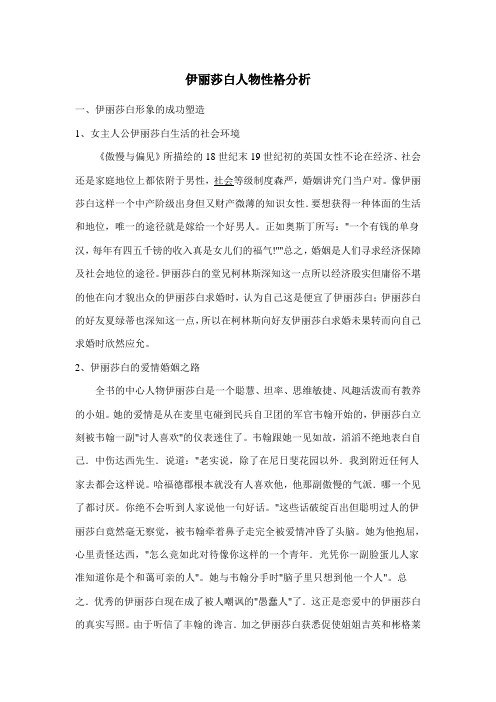
伊丽莎白人物性格分析一、伊丽莎白形象的成功塑造1、女主人公伊丽莎白生活的社会环境《傲慢与偏见》所描绘的18世纪末19世纪初的英国女性不论在经济、社会还是家庭地位上都依附于男性,社会等级制度森严,婚姻讲究门当户对。
像伊丽莎白这样一个中产阶级出身但又财产微薄的知识女性.要想获得一种体面的生活和地位,唯一的途径就是嫁给一个好男人。
正如奥斯丁所写:"一个有钱的单身汉,每年有四五千镑的收入真是女儿们的福气!''"总之,婚姻是人们寻求经济保障及社会地位的途径。
伊丽莎白的堂兄柯林斯深知这一点所以经济殷实但庸俗不堪的他在向才貌出众的伊丽莎白求婚时,认为自己这是便宜了伊丽莎白;伊丽莎白的好友夏绿蒂也深知这一点,所以在柯林斯向好友伊丽莎白求婚未果转而向自己求婚时欣然应允。
2、伊丽莎白的爱情婚姻之路全书的中心人物伊丽莎白是一个聪慧、坦率、思维敏捷、风趣活泼而有教养的小姐。
她的爱情是从在麦里屯碰到民兵自卫团的军官韦翰开始的,伊丽莎白立刻被韦翰一副"讨人喜欢"的仪表迷住了。
韦翰跟她一见如故,滔滔不绝地表白自己.中伤达西先生.说道:"老实说,除了在尼日斐花园以外.我到附近任何人家去都会这样说。
哈福德郡根本就没有人喜欢他,他那副傲慢的气派.哪一个见了都讨厌。
你绝不会听到人家说他一句好话。
"这些话破绽百出但聪明过人的伊丽莎白竟然毫无察觉,被韦翰牵着鼻子走完全被爱情冲昏了头脑。
她为他抱屈,心里责怪达西,"怎么竞如此对待像你这样的一个青年.光凭你一副脸蛋儿人家准知道你是个和蔼可亲的人"。
她与韦翰分手时"脑子里只想到他一个人"。
总之.优秀的伊丽莎白现在成了被人嘲讽的"愚蠢人"了.这正是恋爱中的伊丽莎白的真实写照。
由于听信了丰翰的谗言.加之伊丽莎白获悉促使姐姐吉英和彬格莱先生分离的主使人竟是达西,对达西的愤恨和对吉英幸福不可得的心痛完全控制了伊丽莎白的头脑她断定是达西的门户偏见和想把自己妹妹许配给彬格莱先生的自私想法导致了吉英和彬格莱先生分手。
《傲慢与偏见》中伊丽莎白性格浅析

《傲慢与偏见》中伊丽莎白性格浅析摘要:《傲慢与偏见》是19世纪英国著名小说家简·奥斯汀一部经久不衰的作品。
在这部小说中,《傲慢与偏见》展示了各种各样的女性形象,如反封建女主人公伊丽莎白以及满足于传统命运的女性形象贝纳特姐妹和卡洛特·卢卡斯,通过分析来深入表现女性发展的源泉。
这种根源在于父权制社会里,女性地位低下,而且女性长期遭遇一系列的困难和不公,如受教育的不平等,缺乏隐私权,养儿育女,承担无休止的家庭义务等。
本文从简·奥斯汀在《傲慢与偏见》中所塑造的女性形象伊丽莎白的性格分析出发,系统展开论述从伊丽莎白对待婚姻的态度上所反映的女性意识,以及几种影响婚姻的重要因素和其对社会生活的重要影响。
关键词:反封建;婚姻观;简·奥斯汀;女性意识;《傲慢与偏见》;伊丽莎白对于英国女作家奥斯汀,她一生创作了六部作品,每部都很成功,对于她的代表作一向以来存在争议,《爱玛》,《傲慢与偏见》,作者自己说在理性和情趣方面后者胜过前者,经过时间的检验,后者的读者始终多过前者,正如一个人的举止可以反映他的性格,在对待婚姻上同样可以反映一个人的性格。
本文着重探讨女主角伊丽莎白的性格。
一、伊丽莎白的性格分析及其对待婚姻的态度《傲慢与偏见》的中心和焦点人物是伊丽莎白·贝纳特。
她及其聪明,并且活泼大方、有思想、有主见,是一个具有反抗精神和独立人格的新女性。
她首先拒绝了柯林斯的求婚,后来又拒绝了达西。
拒绝求婚充分反映出她(也是作者奥斯汀)的婚姻观:爱情至上。
牧师柯林斯先生是贝纳特先生(伊丽莎白的父亲)的表侄,也是贝纳特先生的财产继承人,他是个自负、谦卑的蠢汉,善于巴结权贵的小人。
他因受了贵族夫人凯瑟琳·德·包尔夫人的赏识,得到了教区牧师的肥差,由此越发的变得妄自尊大、自命不凡。
他自认为自己有财产又有崇高的社会地位,要娶贝纳特家的女儿为妻,肯定易如反掌,不会有任何问题。
《傲慢与偏见》中伊丽莎白的人物形象分析报告
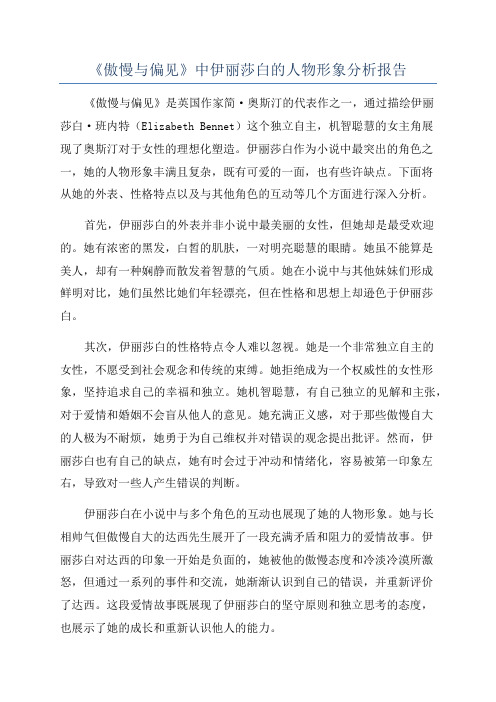
《傲慢与偏见》中伊丽莎白的人物形象分析报告《傲慢与偏见》是英国作家简·奥斯汀的代表作之一,通过描绘伊丽莎白·班内特(Elizabeth Bennet)这个独立自主,机智聪慧的女主角展现了奥斯汀对于女性的理想化塑造。
伊丽莎白作为小说中最突出的角色之一,她的人物形象丰满且复杂,既有可爱的一面,也有些许缺点。
下面将从她的外表、性格特点以及与其他角色的互动等几个方面进行深入分析。
首先,伊丽莎白的外表并非小说中最美丽的女性,但她却是最受欢迎的。
她有浓密的黑发,白皙的肌肤,一对明亮聪慧的眼睛。
她虽不能算是美人,却有一种娴静而散发着智慧的气质。
她在小说中与其他妹妹们形成鲜明对比,她们虽然比她们年轻漂亮,但在性格和思想上却逊色于伊丽莎白。
其次,伊丽莎白的性格特点令人难以忽视。
她是一个非常独立自主的女性,不愿受到社会观念和传统的束缚。
她拒绝成为一个权威性的女性形象,坚持追求自己的幸福和独立。
她机智聪慧,有自己独立的见解和主张,对于爱情和婚姻不会盲从他人的意见。
她充满正义感,对于那些傲慢自大的人极为不耐烦,她勇于为自己维权并对错误的观念提出批评。
然而,伊丽莎白也有自己的缺点,她有时会过于冲动和情绪化,容易被第一印象左右,导致对一些人产生错误的判断。
伊丽莎白在小说中与多个角色的互动也展现了她的人物形象。
她与长相帅气但傲慢自大的达西先生展开了一段充满矛盾和阻力的爱情故事。
伊丽莎白对达西的印象一开始是负面的,她被他的傲慢态度和冷淡冷漠所激怒,但通过一系列的事件和交流,她渐渐认识到自己的错误,并重新评价了达西。
这段爱情故事既展现了伊丽莎白的坚守原则和独立思考的态度,也展示了她的成长和重新认识他人的能力。
伊丽莎白与其他姐妹和家人之间的互动也是小说中重要的一部分。
她与姐姐简的关系非常亲密,她们之间有着深厚的情感纽带,互相给予支持和鼓励。
伊丽莎白也与母亲和父亲有着不同的关系,她是父亲的宠儿,而对母亲的婚姻观念持有批判和保留态度。
《傲慢与偏见》中伊丽莎白的人物性格分析

山西 能源学 院学 报
J o u m ̄ o f S h a n x i I n s t i ut t e o f E n e r g y
Aug . , 201 7
V0 1 . 3 O No . 3
・
社 会科学研究 ・
《 傲慢与偏见》 中的爱情和婚姻不仅是个人情感问 题, 更是家族经济 问题 , 是一个事关人们 生存 的 问 题 。所以, 班 内特女儿的婚姻不是单纯的情爱 问题 ,
翰忠诚的爱情 。不管这两个事件最后 的结果是 什 么, 也可以在解读伊丽莎 白性格过程中看 出她生而 为人的一面 , 也是有 了这完美 中的不完美一笔才促 使伊丽莎 白这个人物形象饱满的呈现在读 者面前 , 才有了以后牵动人们内心的“ 自 我改造 ” 之说。在美 好 的事物 面 前 , 所 有 的不 美好 都 是 为 了最后 的结 局 而设定的 , 伊丽莎 白的偏执和盲 目正是为着寻找 自 我的挑战而出现 , 这是值得分析和解读 的。 二、 伊 丽莎 白的性 格对 其 生活 的影 响 ( 一) 有主见、 有思想的性格对其婚姻的影响 “ 没有钱 , 婚姻是愚蠢的。” 这是小说《 傲慢与偏
一
、
剖析《 傲慢与偏见》 中伊丽莎 白的性格特征
道人性 的纯 良和诚实远 比家境殷实 、 生活安逸要幸
福得多 , 她 能 够 一 眼 就 看 出那 些讨 好 的 、 不 怀 好 意
( 一) 有主见、 有思想 小说《 傲熳与偏见》 的中心人物是伊丽莎白・ 贝纳
特, 也 是她 串联起 整部小 说 的线索 。她聪 明 、 独立 、 活
自家 的姐 妹会 绊住 其离 开 的脚步 。再 比如对 于 夏绿 蒂 和 科 斯林 的 婚 姻 ,伊 丽 莎 白坚 持 自 己的 怀 疑 态 度 。虽 然她 知道 夏绿 蒂在 很 多事情 上 与她都 持 有不
名著人物名著人物的性格解读与情感体验
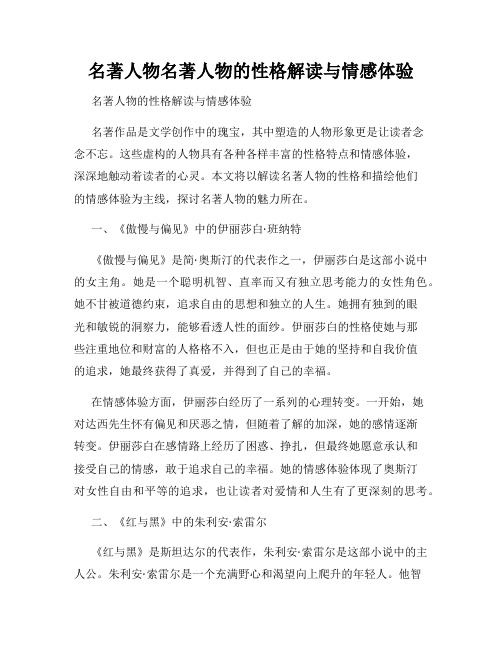
名著人物名著人物的性格解读与情感体验名著人物的性格解读与情感体验名著作品是文学创作中的瑰宝,其中塑造的人物形象更是让读者念念不忘。
这些虚构的人物具有各种各样丰富的性格特点和情感体验,深深地触动着读者的心灵。
本文将以解读名著人物的性格和描绘他们的情感体验为主线,探讨名著人物的魅力所在。
一、《傲慢与偏见》中的伊丽莎白·班纳特《傲慢与偏见》是简·奥斯汀的代表作之一,伊丽莎白是这部小说中的女主角。
她是一个聪明机智、直率而又有独立思考能力的女性角色。
她不甘被道德约束,追求自由的思想和独立的人生。
她拥有独到的眼光和敏锐的洞察力,能够看透人性的面纱。
伊丽莎白的性格使她与那些注重地位和财富的人格格不入,但也正是由于她的坚持和自我价值的追求,她最终获得了真爱,并得到了自己的幸福。
在情感体验方面,伊丽莎白经历了一系列的心理转变。
一开始,她对达西先生怀有偏见和厌恶之情,但随着了解的加深,她的感情逐渐转变。
伊丽莎白在感情路上经历了困惑、挣扎,但最终她愿意承认和接受自己的情感,敢于追求自己的幸福。
她的情感体验体现了奥斯汀对女性自由和平等的追求,也让读者对爱情和人生有了更深刻的思考。
二、《红与黑》中的朱利安·索雷尔《红与黑》是斯坦达尔的代表作,朱利安·索雷尔是这部小说中的主人公。
朱利安·索雷尔是一个充满野心和渴望向上爬升的年轻人。
他智慧、机智且有着坚定的意志力,他渴望通过自己的努力来改变命运。
朱利安热衷于追求权力和地位,他通过谋略和机智,在社会上不断攀升。
然而,他的心中又常常被矛盾和挣扎所困扰。
朱利安身处的社会充满伪善和狡诈,他不得不不断迎合和妥协,这给他的内心带来了巨大的冲突。
朱利安的情感体验同样丰富多彩。
他经历了与玛丽安的爱情,却又因社会地位和家族的反对而远离她。
他对玛丽安的情感犹豫不决,对自己的心灵产生了冲击。
朱利安的情感体验唤醒了读者对于伦理和道德观念的思考,也让人深思社会背景对于个体情感的影响。
高中语文外国文学作品人物形象鉴赏

高中语文外国文学作品人物形象鉴赏外国文学作品中的人物形象往往充满着生动的个性,他们具有各自的特点、结构和命运,通过对其形象的描写和表现,读者可以更好地理解作品的主题和情感。
以下是我对几位外国文学作品中人物形象的鉴赏和评价。
《傲慢与偏见》中的伊丽莎白·班纳特伊丽莎白·班纳特是《傲慢与偏见》中的女主人公,她聪明、机智、果敢、善良,勇于拥抱真实的自我和世界。
伊丽莎白是她所在社交阶层中的一个反叛者,她不愿意妥协自己的原则和对人的价值观,坚定地拒绝了那些以社会地位、财富和门第为前提的婚姻。
她是一个现代的、浪漫的和独立的女性形象,她的出现预示着人们对传统观念的解放和对自由和平等的渴望。
伊丽莎白的性格具有自我尊严的特点,她坚持自己的看法和态度,为自己的思想和信念而战。
但是,她并不是一个傲慢自大的人,她意识到自己的不足之处,并不断地自我纠正和进步。
伊丽莎白的形象表达了女性自我解放的力量和意义,她成为了现代女性的精神榜样和固有价值的象征。
《罪与罚》中的罗迪翁·拉斯柯尔尼科夫罗迪翁是杜斯妥也夫斯基的小说《罪与罚》中的主人公,他是一个被社会排斥和嘲笑的人,他的贫穷和病态使他对世界充满了绝望和愤慨。
罗迪翁的性格既复杂又丰富,他有着强烈的良知和思想,却在现实中陷入了境况的被动和难以解脱的苦难。
罗迪翁的形象表现出人的内在复杂性和社会的虚伪和罪恶。
他的形象是对人性的深刻探索和对社会现状的尖锐批判。
罗迪翁是杂乱无章的、混乱的、无序的现代性的体现,他是一个孑然一身的反叛者,标志着俄国文学的开端。
《格列佛游记》中的格列佛格列佛是乔纳森·斯威夫特的小说《格列佛游记》中的主人公,也是著名的虚构人物。
他是一个冒险家和旅行家,用他的智慧和勇气,挑战了许多令人难以置信的奇遇和冒险。
格列佛的性格既是善良、正义、聪明,又有些单薄和超脱。
格列佛的形象代表了人们对忠诚、勇气和冒险的向往和追求。
他是一个冒险家和探险家,意味着人们不断探索世界和追求真理的精神。
傲慢与偏见中的伊丽莎白是我心目中的独立女性

傲慢与偏见中的伊丽莎白是我心目中的独立女性伊丽莎白·班纳特是英国作家简·奥斯汀的小说《傲慢与偏见》中的主人公之一,她是我心目中的独立女性典范。
她以其聪明、勇敢和独立的个性给读者们留下了深刻的印象。
本文将通过分析她在小说中的形象、行为和思想等方面来阐述她的独立性特点。
首先,伊丽莎白·班纳特拥有独立的思想和态度。
她对婚姻问题持有独立的见解,不盲从世俗观念。
相比于她的姐姐们,伊丽莎白对婚姻的选择更加谨慎,并不会因为社交地位或财富而迎合他人的意愿。
她坚信婚姻应该基于彼此的尊重、相互的爱慕和价值观的一致,而不是单纯的门当户对。
这种独立思想使她在面对社会舆论和他人的眼光时能保持自己的原则,从而使她在情感选择上做出更为明智的决定。
其次,伊丽莎白·班纳特在家庭关系中表现出了独立的个性。
她与姐姐们迥然不同,敢于坚持自己的观点和意见。
尽管她并非财产的继承者,但她并不因此而屈从于社会对女性的刻板印象。
她追求真正的幸福,不满足于只是依附于有钱有势的人。
她对自己的生活有着明确的目标,并积极寻求自己的利益。
她拒绝了那些薄情寡义的追求者,因为她相信自己值得拥有一个真正珍视她的伴侣。
另外,伊丽莎白·班纳特以其聪明才智展现了独立的能力。
她拥有一双敏锐的眼睛,能够看穿别人伪善的外表和虚伪的动机。
不像其他人那样轻易受人蛊惑,她在观察和判断他人时保持冷静和客观。
她善于运用智慧的笔触,在社交场合中展示自己的机智和幽默。
她与达西先生的争吵和自己对他的误解,更加凸显了她的独立思想和意识。
最后,伊丽莎白·班纳特在追求个人独立时也充满情感的脆弱。
虽然她表现出自我主张,但她也有着柔软的一面。
她对姐姐简的关爱和对家庭的责任感,使她在一些问题上对自己的要求变得更加严苛。
她在与达西相遇之初对他产生的偏见和误解,正是因为她的过于自卑和对社会阶层差异的过度关注。
然而,随着时间的推移,她逐渐认识到了自己的错误和偏见,并学会了宽容与理解。
傲慢与偏见伊丽莎白性格特点是怎样的

傲慢与偏见伊丽莎白性格特点是怎样的(最新版)编制人:__________________审核人:__________________审批人:__________________编制单位:__________________编制时间:____年____月____日序言下载提示:该文档是本店铺精心编制而成的,希望大家下载后,能够帮助大家解决实际问题。
文档下载后可定制修改,请根据实际需要进行调整和使用,谢谢!并且,本店铺为大家提供各种类型的经典范文,如诗歌散文、原文赏析、读书笔记、经典名著、古典文学、网络文学、经典语录、童话故事、心得体会、其他范文等等,想了解不同范文格式和写法,敬请关注!Download tips: This document is carefully compiled by this editor.I hope that after you download it, it can help you solve practical problems. The document can be customized and modified after downloading, please adjust and use it according to actual needs, thank you!In addition, this shop provides you with various types of classic sample essays, such as poetry and prose, original text appreciation, reading notes, classic works, classical literature, online literature, classic quotations, fairy tales, experience, other sample essays, etc. if you want to know the difference Please pay attention to the format and writing of the sample essay!傲慢与偏见伊丽莎白性格特点是怎样的【导语】:傲慢与偏见是一部非常经典的名著,伊丽莎白是其中的女主人公。
傲慢与偏见伊丽莎白班内特的聪明才智与爱情触动
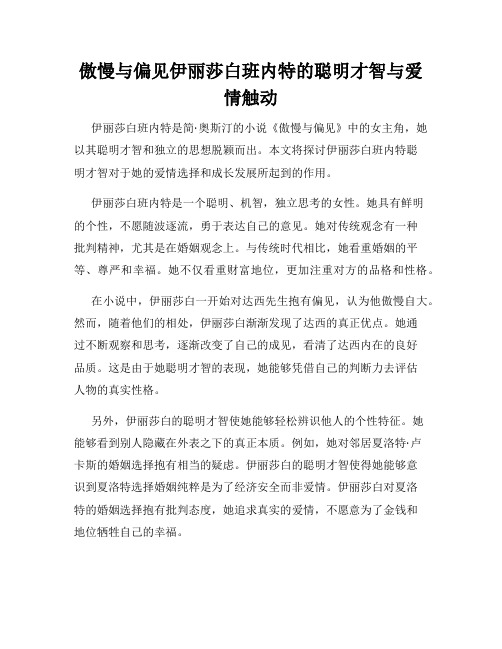
傲慢与偏见伊丽莎白班内特的聪明才智与爱情触动伊丽莎白班内特是简·奥斯汀的小说《傲慢与偏见》中的女主角,她以其聪明才智和独立的思想脱颖而出。
本文将探讨伊丽莎白班内特聪明才智对于她的爱情选择和成长发展所起到的作用。
伊丽莎白班内特是一个聪明、机智,独立思考的女性。
她具有鲜明的个性,不愿随波逐流,勇于表达自己的意见。
她对传统观念有一种批判精神,尤其是在婚姻观念上。
与传统时代相比,她看重婚姻的平等、尊严和幸福。
她不仅看重财富地位,更加注重对方的品格和性格。
在小说中,伊丽莎白一开始对达西先生抱有偏见,认为他傲慢自大。
然而,随着他们的相处,伊丽莎白渐渐发现了达西的真正优点。
她通过不断观察和思考,逐渐改变了自己的成见,看清了达西内在的良好品质。
这是由于她聪明才智的表现,她能够凭借自己的判断力去评估人物的真实性格。
另外,伊丽莎白的聪明才智使她能够轻松辨识他人的个性特征。
她能够看到别人隐藏在外表之下的真正本质。
例如,她对邻居夏洛特·卢卡斯的婚姻选择抱有相当的疑虑。
伊丽莎白的聪明才智使得她能够意识到夏洛特选择婚姻纯粹是为了经济安全而非爱情。
伊丽莎白对夏洛特的婚姻选择抱有批判态度,她追求真实的爱情,不愿意为了金钱和地位牺牲自己的幸福。
此外,伊丽莎白的聪明才智在她的成长发展中起到了重要的作用。
她面临着傲慢和偏见的挑战,学会如何在这个社会中保持自己的独立性和尊严。
她通过面对各种困难和挑战,不断发展和成长。
她理解到一个人的价值并不仅仅取决于其财富或地位,而是取决于其品德和性格。
她对自己的追求使她能够坚定地逐渐成长为一个有见解、有判断力的女性。
她坚信自己的聪明与独立思考可以带给她真正的幸福。
最后,伊丽莎白的聪明才智也影响了她的爱情选择。
她拒绝了一个富有但傲慢的求婚者,因为她深知金钱地位并不能满足她的内心需求。
她追求真正的爱情,并最终与达西先生走到一起。
她的聪明才智使她在众多的婚姻选择中找到了适合自己的伴侣,这样的选择也为她带来了真正的幸福。
《傲慢与偏见》中伊丽莎白性格及成因分析(英文版)

《傲慢与偏见》中伊丽莎白性格及成因分析(英文版)《傲慢与偏见》是18世纪末、19世纪初英国著名女作家简·奥斯丁的代表作。
小说通过描写班纳特五个女儿对待终身大事的不同处理展现作者对批判现实主义时期女性爱情婚姻观的独特见解,尤其是通过女主人公伊丽莎白形象的塑造表现作者的自我追求和女权主义意识的觉醒。
本文首先试图从作品的故事情节、语言及与其他主人公的对比等方面对伊丽莎白的性格进行剖析,突出描写女主人公自尊自爱、聪明理智、争取平等与自由的女性意识,进而分析伊丽莎白性格形成的内外因以及奥斯丁女权主义观念因素等影响,使得读者对伊丽莎的形象能有更为深刻的认识。
Pride and Prejudice is a masterpiece of Jane Austen who was a famous woman writer in the early 19th century. By describing Bennet’s five daughters’different attitudes to marriage, the author reveals her unique view on woman’s attitude towards love and marriage in that realistic age. The novel highlighted the character of Elizabeth to express the author’s pursuit ofself-realization and her awareness of feminism. This paper first explores Elizabeth’s personality in the terms of plot, conversation and comparison between other figures, especially on Elizabeth’s self-esteem, intelligence, reason, pursuit of freedom and equality. Then this paper sums up the deep causesof Elizabeth’s which are affected by internal factors, external factors as well as the influence of Austen’s feminism. From the above analysis, readers might get a deep understanding of the image of Elizabeth.1. Introduction1.1 Introduction of the authorJane Austen (1775-1817), an early 19th century woman writer, has been regarded as a great classic novelist in World literature. Austen was born in 1775 at Steventon in Hampshire, England. As a daughter of the local rector, although she never accepted formal school education, she was well educated by her family. The wide range of activities within the Austen family –country walks, charades, reading, writing stories and family plays constituted a rich informal education for the children, and stimulated Jane Austen’s ambition to become a novelist [1]1. As a matter of fact, besides drawing and playing the piano, all her education was closely linked to read her father’s books of both the serious and the popular literature of the day. So she read a lot, at the age of 11or 12, she began to write [2]1. During her life,she looked upon her writing as her child. As a female novelist, with her unique feminine sensitivity, she focused on love and marriage of the women at that time and finished six vivid and dramatic novels through her short life: Sense and Sensibility (1811), Pride and Prejudice (1813), Mansfield Park (1814), Emma (1816), Northanger Abbey (1818), and Persuasion (1818). Her novels are highly praised not only for their light irony, humor of her contemporary English country life, but also for their underlying serious quality. “For Jane Austen was compelled to accomplish an almost unprecedented feat—to become an artist while remaining a lady.”[3]345 Walt Scott recognized her achievement in Pride and Prejudice and confided to his journal, “That young lady had a talent for describing the involvements and feelings and characters of ordinary life which is to me the most wonderful I never met with. They indicate the confirmation of Austen’s status in the literary field. This confirmation comes from the profundity her works reveal and her special insight into the society she lived in.”[4]56Austen is good at describing people’s different kinds of marriage from the perspective of people’s pursuit and value of marriage. From her novels, readers can get a clear picture of the customs of the upper middle class, such as the relation betweenmarriage and fortune, the awakening of women at that time, etc [2]2 . Pride and Prejudice is her representative novel. The title, Pride and Prejudice, is originated from one sentence in a book Evelina written by an English writer called Fanny Burney. The sentence is roughly like this: “the whole unfortunate accident is the outcome of Pride and Prejudice.”The initial title of the novel “Pride and Prejudice”is “First Impressions”[5]31. Austen began to write Pride and Prejudice at the age of 21, but the manuscript “went begging”for 16 years at the doors of publishers before it was published in 1813. The plot is simple, but the author has described vivid pictures of the everyday life of simple country society. Through the description of the daily talks and activities of young men and women, Austen paints their characteristics. She is at her best in writing about young girls, because she understands them very well.1.2 Plot of Pride and PrejudicePride and Prejudice focuses on a pair of sisters as they pursue prospects for marriage. There are five Bennet sisters in all, including the beautiful Jane, the clever Elizabeth, the bookish Mary, the immature Kitty and the wild Lydia, who have beenraised by their shallow mother with one purpose in life: finding a husband for each of her daughter. Because lacking of a male heir, Mr. Bennet’s property has been inherited to his nearest male relative, Reverend William Collins. Their lives are turned upside down when a wealthy young man Mr. Bingley and his best friend Mr. Darcy arrive in their neighborhood. Bingley immediately falls in love with Jane because of her beauty and sweetness. However, his noble friend Mr. Darcy offends Elizabeth by pronouncing her “tolerable”looking and refusing to ask her to dance. From then on, Elizabeth holds a deep-rooted prejudice against Darcy. However, Mr. Darcy finds himself increasingly attracted by Elizabeth’s charm and intelligence. Elizabeth meets Darcy by accident while visiting Charlotte and Mr. Collins. She is shocked when Darcy suddenly proposes to her, and angrily rejects him, accusing him of separating Bingley and Jane and of being unjust to Wickham and of humiliating her and her relatives. The next day Darcy gives her a letter explaining and justifying his conduct. Elizabeth gradually comes to accept the truth of everything Darcy says and has more reason than ever to regret her prejudice against the man. But then Elizabeth’s sister Lydia elopes with Wickham, who has no intention of marrying her. Darcy deals with this event quickly, who pressures Wickham intohonoring his commitment thereby preserving the Bennet family’s good reputation. [11]18-20 At last, when Darcy returns to the neighborhood, he comes to propose again. This time he is accepted.2. The manifestations of Elizabeth’s character“I must confess that I think her as delightful a character as ever appeared in print, and how I shall be able to tolerate those who do not like her at least I do not know.”[6]4 This was how Jane Austen described her character Elizabeth Bennet. From this sentence, we can see that Elizabeth is Austen’s favorite character. Austen’s attitude and her ideal of life are expressed through Elizabeth’s rational view of love and marriage, her actual choice and her satisfactory ending. [2]25 Elizabeth’s light spirit and courage, wit and readiness as well as good sense and good feeling make her stand above other characters in the book.2.1 ReasonComparatively speaking, Elizabeth is the most wise and rational person in her family. Her mother “was a woman of mean understanding, little information, and uncertain temper”[7]3; her father is able to adapt himself to different circumstances and very passive; and her three sisters who are very shallow, reckless, self-willed. Elizabeth lives in a world which full of the foolish people, but she is the only one who has the ability of reason. From the above analysis, we can draw a conclusion that Elizabeth is out of the ordinary and has worldly wisdom.“She is tolerable; but not handsome enough to tempt me; and I am in no humour at present to give consequence to young ladies who are slighted by other men.”[7]8 Although Mr. Darcy refused to dance with her and made unfavorable remarks on her on their first meeting in the dancing party, Elizabeth could still tell the story of Darcy’s insult to her friends [8]46. This action shows her maturity and her ability to see humor even in something offensive to her, “for she had a lively playful disposition, which delighted in anything ridiculous”[7]9. After the first dancing party, the conversation between Elizabeth and her elder sister, Jane, reveals that Elizabeth can see the faults of Bingley’s sisters whereas Jane can not. “Elizabeth…with more quickness of observation and less pliancy of temper than hersister, and with a judgment too unassailed by any attention to herself, she was very little disposed to approve them. They were in fact very fine ladies; …but proud and conceited”[7]11.Elizabeth shows her ability of reason in handling marriage. The most impressive scene is that she refuses Mr. Collins’s proposal, though Collins warns her that other proposals may not be made to her because of her impoverishment. However, Elizabeth doesn’t love him, she refuses his proposal firmly. She would rather stay single than marry to Mr. Collins. She can choose the proper things that suit her. So Elizabeth’s pride is based on her ability of observation, analysis and selection.When Elizabeth realizes the truth and tries to overcome her prejudice to Darcy, her reason plays an important role. After she read of Darcy’s letter by self-reflection, analysis, comparison and self-criticism, she not only changes her mind against Darcy, but also comes to a moment of intense realization of herself[9]65-66. “She grew absolutely ashamed of herself. Of neither Darcy nor Wickham could she think without feeling that she had been blind, partial, prejudice, absurd. ”[7]178 She said, “I never knew myself.”To deny one self is really the beginning of one’s progress. Here Jane Austen put forward a positive view of lifeand suggests a way of finding a valid mode of existence, of achieving harmony. The world as it is, but the individual can define his world, and thus conquers it to lead a contented, yet aware life if he is prepared to take a painful and possible difficult path [3]345.2.2 Self-esteemCompared with Darcy, the difference is that Elizabeth doesn’t have a sense of superiority on her social status and family origin, on the contrary, she has clear awareness and special sensitivity [10]84-86. Thus when Elizabeth rejects Lady Catherine’s despotic demand, she evaluates herself by counterpart’s moral values, saying, “Your nephew is a gentleman, I am a gentleman’s daughter, so far we are equal. [7]306”In contrast with Charlotte Luca’s obsequiousness before Lady Catherine de Bourgh, Elizabeth is without doubt much more respectable for her self-esteem. Elizabeth behaves quite admirably when she condemns the lady to her face that she is not entitled to interfere in her concerns, and directly makes clear her standpoint.“I am only resolved to act in that manner which will, in my own opinion, constitute my happiness, without reference to you, or to any person so wholly unconnected with me.”[7]307When Lady Catherine thinks younger girls in a family were not permitted to enter the society before their elder sisters did so, and insults Elizabeth’s parents who are regarded doesn’t educate their daughters good, Elizabeth is against the convention at that time.“I think it would be very hard upon younger sisters that they should not have their share of society and amusement because the elder may not have the means or inclination to marry early. The last-born has as good a right to the pleasures of youth as the first. And to be kept back on such a motive! I think it would not be very likely to promote sisterly affection or delicacy of mind. [7]143”2.3 IntelligenceAt the first chapter of the book, Mr. Bennet appraises his five daughters saying, “They are all silly and ignorant like other girls; but Lizzy has something more of quickness than her sisters”[7]3.From this sentence, we have a first impression that Elizabeth’s intelligence is much better than her sisters’. We also can see Elizabeth’s intelligence through her conversation. Her dialogue with Darcy, her father and Jane is full of humor, keen analysis and wise comprehension. We just appreciate one wonderful conversation between Elizabeth and Darcy. Clever as Darcy is, he cannot easily overcome Elizabeth in battle of wits [11]14. When Miss Bingley is playing a lively Scotch air, Darcy asks Elizabeth to dance a reel. Elizabeth attempts to revenge Darcy for his previous refusal to accept her as dancer partner because of her “tolerable”figure.“She smiled, but made no answer. He repeated the question, with some surprise at her silence.“Oh!”said she, “I heard you before; but I could not immediately determine what to say in reply. You wanted me, I know, to say ‘yes’, that you might have the pleasure of despising my taste; but I always delight in overthrowing those kind of schemes, and cheating a person of their premeditated contempt, I have therefore made up my mind to tell you that I do not want to dance a reel at all—and now despise me if you dare.”[7]43Elizabeth seldom speaks without an elegant manner. She “has more freedom of maneuver with language, more conceptual space to move around in, [12]87”and as a result, she can forecast things and is capable of independence and think out conclusions of her own. Compared with Jane whose manner is elegant and temper is mild, Elizabeth has advantages of owning much sense. Unlike Jane who thinks everyone is kind, Elizabeth can think more deeply than her. She advises Jane not too honest to see through the foolishness and dullness of those who pretend to be frank to her. She always points out those people’s inconsistency to Jane [5]32. She makes the exact judgment about their tales in breaking the love affairs between M r. Bingley and Jane.Elizabeth has “more quickness of observation and is capable of both complex impressions and complex ideas”[12]88. Her first impression about Darcy’s house, Pemberly, is accurate. She thinks that Pemberly is neither gaudy nor uselessly fine, with less of splendor and more real elegant. The decoration style indicates Darcy’s values which are in the terms of self-cultivation and moral quality rather than materials. After this visiting she also has a better understanding about Darcy’s personality and quality. Through talking with housekeeper, she learns that Darcy,as a brother, a landlord and a master, is always thesweetest-tempered and generous-hearted person, who shows consideration for the poor and takes care of his sister very carefully. From this event we know that Elizabeth’s sensibility and intelligence rarely fail her in her reading of human minds, observing life and drawing out her correct first impression.2.4 RebellionIt can be imagined that Elizabeth with a certain amount of mental independence would own a strong mind and would refuse to submit to others’pressure and to be their appendage. She is a rebel of her time, longing for individual liberty and equality between sexes [12]87. Thus we are not surprised to find her firm refusal of Darcy’s first lordly proposal and total declination of Lady Catherine’s despotic demand of extract a promise from Elizabeth that she will not marry Darcy. The conversation between Lady Catherine and Elizabeth fully exposes Elizabeth’s rebellious spirit.“Let us sit down. You are to understand, Miss Bennet, that I came here with the determined resolution of carrying my purpose; nor will I be dissuaded from it. I have not been used tosubmit to any person’s whims. I have not been in the habit of brooking disappointment.”“That will make your ladyship’s situation at present more pitiable; but it will have no effect on me.”“I shall not go away till you have given me the assurance I require.”“And I certainly never shall give it. I am not to be intimidated into anything so wholly unreasonable…You have widely mistaken my character, if you think I can be worked on by such persuasions as these…but you have certainly no right to concern yourself in mine…”[7]305-307Bingely’s sisters pride themselves on having a good taste and are elegant in their manners and their appearance, but Elizabeth thinks they are a lack of inner integrity that are in fact nothing but “crows in the phoenix’s gaudy garments”[12]87. She makes good use of her cleverness and intellect to challenge the upper-class people who show contempt against her. She does not permit her ‘will’to be dictated to by another, and she will never admit the submissive role traditionally ascribed to women[13]50. Her excellent spiritual state makes her always in the position of a winner.Elizabeth’s attitude to marriage is independent and rebellious. Her view of marriage is much different from traditional woman in her time. As a traditional woman, Mrs. Bennet, her mother, blindly wants to find rich men as her daughters’husbands, while Elizabeth is not influenced by economic pressure. She is not rich, but never ready to exchange every better self-feeling with material profit. She will only accept the man’s proposal who she loves. What she wants is lifelong companion who has similar interest and taste to her. Her view of marriage is based on love, a kind of romantic love which seems very rebellious in that period of time.3. The causes of Elizabeth’s characterAs we all know that everything in the world has its own cause. The root of Elizabeth’s character also can be analyzed from the next two different perspectives. Social environmental influence was the external factor of Elizabeth’s character; while familysurrounding and view of marriage were the internal factors, which was the internal motive that Elizabeth boldly challenges the upper-class and pursues the ideal and happiness.3.1 The external factors3.1.1 Social environment factorEvery novelist must bear on mind the imprint of society in which he lives; since in the novel he gives the reader a picture of society he see it, and an implied criticism of it, the reader ought to be able to clearly see in his works the reflection of his ideology and society [14]49. During her lifetime, Austen lived through the French Revolution (1789), the rise of Napoleon Bonaparte; the American War of Independence (and the war with England of 1812); the incipient Industrial Revolution; the Feminist controversy of the turn of the eighteenth-century [11]49.All these events,especially the Industrial and French revolutions, brought about great changes in social structure and the ways people lived and thought.In addition, capitalistic utilitarianism and commercialism caused the declining of social morality. People dwell upon these figures with great relish, the income express rank, social aspirations andconsumer power and marriage becomes a transaction from which one want to get benefit [11]51. Personal relations were reduced to a question of pounds, shillings and pence; people’s behaviors were dominated by self-interest. It is manifestation that economic figures can be seen everywhere in Pride and Prejudice: Bingley inherits a hundred thousand pounds from his father, and has four or five thousand a year; Miss Bingley has a fortune of twenty thousand pounds; Darcy has ten thousand a year; Darcy’s sister Georgiana’s dowry is thirty thousand; Mr. Bennet has two thousand pounds a year; Mrs. Bennet’s father leaves her four thousand pounds. Therefore, compared with Darcy and Bingley, Elizabeth’s family is relatively poor and has lower social status. Elizabeth must have a sense of inferiority, so she has to show her good quality thereby hiding her family’s low status.Moreover, at that time, women had long been regarded as inferior to men physically and intellectually. Both law and theology had ordered their subjection [15]34. Women could not in their own name possess property, engage in business, or control the disposal of their children and even their own persons. In order to prove her idea that women are not inherently inferior to men in intelligence, Elizabeth makes herself intelligent andhas a sound judgment. She disagrees with deep-rooted social notions of the purpose of women’s marriage is predominantly for financial security and she claims that a woman’s marriage should be based on mutual love, mutual respect and mutual understanding.3.2 Internal factors3.2.1 Family factorElizabeth Bennet lives in a society of stationary characters in its conditions and outlook. Generations are born and die and are succeed by their descendents, living in the same places and doing the same things. There is so little change of ideas; democracy has not yet raised her horrid head; money is a potential problem; courtship has its own dramas [12]86. People around her are almost all foolish, passive and reposeful, though there are a few exceptions.Her father, Mr. Bennet is a country gentleman in whom irony is the most prominent quality and who by appreciation of character makes some amends for the selfish indifference, which is the ground of his character [12]86. With no doubt, Elizabeth inherits her father’s taste and intellect, as well as a strong criticaljudgment. But there is as much likeness between mother and daughter as may exist between a lively and sensible woman and a lively fool. “Mrs. Bennet is a woman of mean understanding, little information, and uncertain temper.”[7]3 Her feelings, impulsiveness, judgments and speeches are generally wrong, while Elizabeth’s are generally right. To some extent, her character is greatly affected by her father not by her mother.Negative family background partly influences Elizabeth’s character. With ignorant mother, incompetent father as well as reckless and self-willed sisters, Elizabeth is often looked up down by others [16]211. With time going, she wants to be a clever girl and ask others to pay much more attention to her intellect and her unique talent, thereby alleviating surrounding people’s contempt. As a consequence, her wisdom and intellect are appraised by others.3.2.2 Marriage factorElizabeth’s character is influenced by marriage factor. Through comparing her mother’s and her friend Charlotte’s view of marriage, we can see Elizabeth’s unique attitude to marriage.Mrs. Bennet is at all costs with her blind desperation for marriage [5]34. At the beginning of the novel, when she declares of the new tenant of Netherfield, she says “A single man of large fortune, four or five thousand a year, what a fine thing for our girls”[7]2. This shows Mrs. Bennet expects her daughter marriage well as her only desire in the life and one of Elizabeth’s friend Charlotte views marriage as a “comfortable home”. “At the age of twenty seven, without having ever been handsome, felt all the good luck of it. [7]107”She accepts Collins solely from the pure and disinterested desire of an establishment. While Elizabeth takes a different view to marriage, so she feels ashamed that a friend of hers can fall so far below her own ideals of conduct. She thinks Charlotte as Collin’s wife is “a most humiliating picture”.Elizabeth’s attitude towards love and marriage has progressive social significance. She likes a free choice, not dictated by economic pressure, though there is indeed not the least hint in the book which suggests that she would like to go so far as to totally reject money for love’s sake [12]88. She is not rich, but never ready to sacrifice every better self-feeling to material profit. She rejects to give Mr. Collins her hand because she knows they share not the same ideas and taste. She stands for moral integrity in love affairs. In her eyes, the life long companyshould be the first precondition. She accepts Darcy’s propose because she loves him. She thinks that “he was the exact man whose disposition and talents would most suit her”and “it is a union that must have been to the advantage of both”[12]88. Therefore, Elizabeth’s idea of happiness in marriage has to do with individual compatibility and affection, what Charlotte presumably means by “romantic”. This point of view is really superior to the traditional view at that time.4. Influence of Austen’s feminism“It is a truth universally acknowledged that a single man in possession of a good fortune must be in want of a wife.”[7]1 This is opening sentence of Pride and Prejudice. From the first sentence, we can know women’s dreadful situation that is to say women have no economic status. Ellen Moers pointed out that Austen wrote at a time when both men and women found themselves in “a Feminist Controversy”[17]245. Jane Austen shows the strong protest against secular prejudice towards the notion of family status and the system of marriage imposed onthe English middle and lower class women between the end of 18th century and the beginning of 19th century [5]33. So from this point, we can see that Austen’s novels all end with an improved feudal society, whose leader is an open-minded gentleman who permits some changes and understands women’s worth and treat them as individuals. At last, the gentleman marries the heroine and secures her of a better life and promising future, and the ideal union of individual desire and social limitations are realized in the heroines’marriages.Austen expresses her view of women in Pride and Prejudice, which is appallingly similar to her radical contemporaries. Through describing Elizabeth’s fine aspiration about asking for the independence of personality and struggling for the equality of human rights, we can see the idea of Jane Austen about woman rights. Elizabeth is anything but merely subservient to the male and represents in some sense the feminist ideal of woman [5]33. Moreover, the figure of Elizabeth reflects not only Austen’s faith in female mind but her belief that intellectual abilities are as desirable in the woman as in the man. Elizabeth herself is intelligent and has a sound judgment, and she does not distinguish people around her according to their gender but according to their intelligence. Jane Bennet and Miss Bingleyboth have qualities which were regarded as marks of feminine excellence in an age which advised women to conceal any mental accomplishments [11]43. Yet neither is judged the equal of Elizabeth Bennet because they lack her “quickness of observation”and “judgment”. This standard of excellence is made by Darcy, who comments that while a woman should cultivate accomplishments such as “music, singing, drawing, dancing, all the modern languages…and to all this she must yet add something more substantial, in the improvement of her mind by extensive reading”[7]32. So Elizabeth is the spokesman of Jane Austen.5. ConclusionJane Austen is a milestone as well as a very important writer in the history of British literature. In her era, British novels seemed to come to a stop, and family reading activity became more and more boring [18]5. She invented her own special mode of fiction, the domestic comedy of middle-class manners, and a dramatic, realistic account of the quiet backwaters of everyday life for thecountry families of Regency England from the late 1790s until 1815 [2]1. All these help her to have the equal name as Sir Walter Scott.Elizabeth, the heroine of Pride and Prejudice, touches the readers all the time everywhere in the world. Elizabeth, who fought for the happy marriage, is an excellent actress, playing an active role on the stage of life. The above study mainly discuses Elizabeth’s four characters, including reason, self-esteem, intelligence and resistance. Generally speaking, Elizabeth is lively, bright, sparkling as well as full of emotion and energy, which make her eyes glow, her words flash, bring the blood to her cheeks so often. [12]1 Then, this paper studies deep causes of Elizabeth’s which are affected by internal factors and external factors as well as the influence of Austen’s feminism.The purpose of this paper is to add luster to getting a better understanding of Elizabeth, then through analyzing her personality and causes, we can understand Austen’s complexity and her opinion of women’s attitude towards self-pursuit, love and marriage.。
《傲慢与偏见》女性形象解读
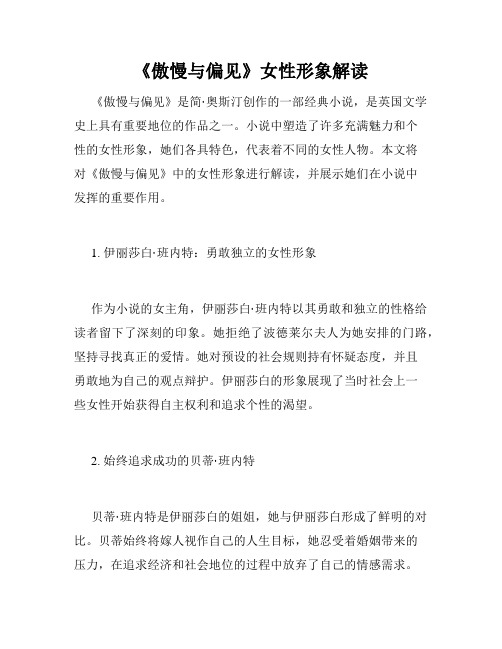
《傲慢与偏见》女性形象解读《傲慢与偏见》是简·奥斯汀创作的一部经典小说,是英国文学史上具有重要地位的作品之一。
小说中塑造了许多充满魅力和个性的女性形象,她们各具特色,代表着不同的女性人物。
本文将对《傲慢与偏见》中的女性形象进行解读,并展示她们在小说中发挥的重要作用。
1. 伊丽莎白·班内特:勇敢独立的女性形象作为小说的女主角,伊丽莎白·班内特以其勇敢和独立的性格给读者留下了深刻的印象。
她拒绝了波德莱尔夫人为她安排的门路,坚持寻找真正的爱情。
她对预设的社会规则持有怀疑态度,并且勇敢地为自己的观点辩护。
伊丽莎白的形象展现了当时社会上一些女性开始获得自主权利和追求个性的渴望。
2. 始终追求成功的贝蒂·班内特贝蒂·班内特是伊丽莎白的姐姐,她与伊丽莎白形成了鲜明的对比。
贝蒂始终将嫁人视作自己的人生目标,她忍受着婚姻带来的压力,在追求经济和社会地位的过程中放弃了自己的情感需求。
贝蒂·班内特的形象揭示了当时社会上一些女性追逐婚姻的渴望,同时也暗示了单纯追求成功而忽视内心感受带来的负面后果。
3. 安妮·德·伯吉斯与女性团结安妮·德·伯吉斯是小说中的另一个女性角色,她是伊丽莎白和简的堂姐妹。
她具备着温和善良的品质,她认为女性间应该互相支持和团结。
她在小说中试图帮助贝丽莎·班内特实现自己的爱情。
她的形象代表了女性之间潜在的团结和互助精神,给了社会一种面对困境时应该团结合作的启示。
4. 夏洛特·卢卡斯的婚姻观夏洛特·卢卡斯是伊丽莎白的朋友,她在小说中对待婚姻问题的态度与众不同。
她不浪漫,也不相信爱情能够带来幸福,她将婚姻视为提高自身社会地位和经济状况的捷径。
夏洛特的形象揭示了当时社会上一些女性为了经济利益而妥协婚姻观念的现象,也反映了当时女性在经济方面的无奈和局限性。
5. 简·班内特:审美标准与现实抉择简·班内特是伊丽莎白和贝蒂·班内特的妹妹,她被认为是真正的美人胚子。
伊丽莎白的坚韧与自主女主角的性格特质
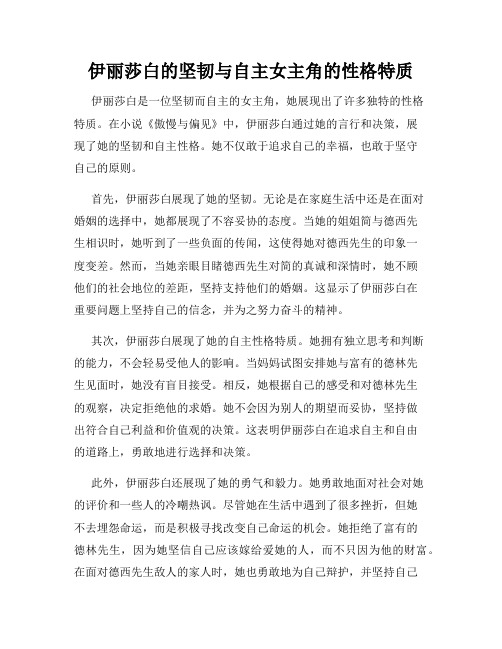
伊丽莎白的坚韧与自主女主角的性格特质伊丽莎白是一位坚韧而自主的女主角,她展现出了许多独特的性格特质。
在小说《傲慢与偏见》中,伊丽莎白通过她的言行和决策,展现了她的坚韧和自主性格。
她不仅敢于追求自己的幸福,也敢于坚守自己的原则。
首先,伊丽莎白展现了她的坚韧。
无论是在家庭生活中还是在面对婚姻的选择中,她都展现了不容妥协的态度。
当她的姐姐简与德西先生相识时,她听到了一些负面的传闻,这使得她对德西先生的印象一度变差。
然而,当她亲眼目睹德西先生对简的真诚和深情时,她不顾他们的社会地位的差距,坚持支持他们的婚姻。
这显示了伊丽莎白在重要问题上坚持自己的信念,并为之努力奋斗的精神。
其次,伊丽莎白展现了她的自主性格特质。
她拥有独立思考和判断的能力,不会轻易受他人的影响。
当妈妈试图安排她与富有的德林先生见面时,她没有盲目接受。
相反,她根据自己的感受和对德林先生的观察,决定拒绝他的求婚。
她不会因为别人的期望而妥协,坚持做出符合自己利益和价值观的决策。
这表明伊丽莎白在追求自主和自由的道路上,勇敢地进行选择和决策。
此外,伊丽莎白还展现了她的勇气和毅力。
她勇敢地面对社会对她的评价和一些人的冷嘲热讽。
尽管她在生活中遇到了很多挫折,但她不去埋怨命运,而是积极寻找改变自己命运的机会。
她拒绝了富有的德林先生,因为她坚信自己应该嫁给爱她的人,而不只因为他的财富。
在面对德西先生敌人的家人时,她也勇敢地为自己辩护,并坚持自己的观点。
这些展示了伊丽莎白勇于追求幸福和挑战社会偏见的意志和毅力。
总的来说,伊丽莎白是一位展现了坚韧与自主女主角的典范。
她坚守自己的信念,不愿妥协,并通过独立的思考和决策展现了她的自主性格特质。
她勇敢地面对挑战,并追求自己的幸福。
伊丽莎白的故事激励着我们要坚定自己的信念,勇敢地追求我们所渴望的生活。
伊丽莎白人物分析
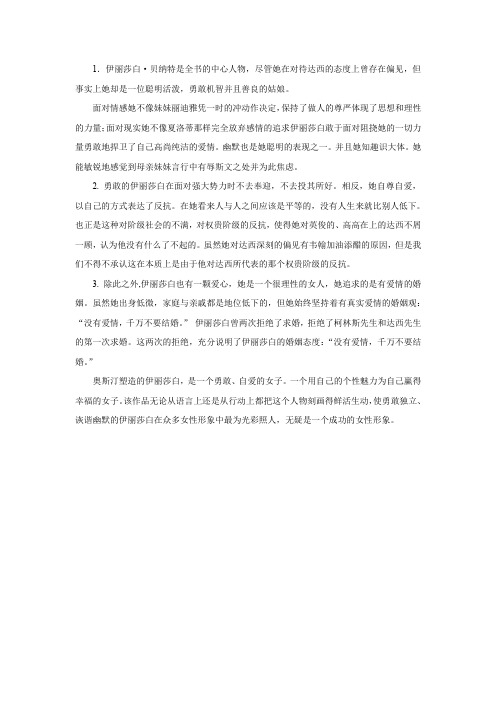
3.除此之外,伊丽莎白也有一颗爱心,她是一个很理性的女人,她追求的是有爱情的婚姻。虽然爱情,千万不要结婚。”伊丽莎白曾两次拒绝了求婚,拒绝了柯林斯先生和达西先生的第一次求婚。这两次的拒绝,充分说明了伊丽莎白的婚姻态度:“没有爱情,千万不要结婚。”
奥斯汀塑造的伊丽莎白,是一个勇敢、自爱的女子。一个用自己的个性魅力为自己赢得幸福的女子。该作品无论从语言上还是从行动上都把这个人物刻画得鲜活生动,使勇敢独立、诙谐幽默的伊丽莎白在众多女性形象中最为光彩照人,无疑是一个成功的女性形象。
1.伊丽莎白·贝纳特是全书的中心人物,尽管她在对待达西的态度上曾存在偏见,但事实上她却是一位聪明活泼,勇敢机智并且善良的姑娘。
面对情感她不像妹妹丽迪雅凭一时的冲动作决定,保持了做人的尊严体现了思想和理性的力量;面对现实她不像夏洛蒂那样完全放弃感情的追求伊丽莎白敢于面对阻挠她的一切力量勇敢地捍卫了自己高尚纯洁的爱情。幽默也是她聪明的表现之一。并且她知趣识大体。她能敏锐地感觉到母亲妹妹言行中有辱斯文之处并为此焦虑。
外国名著,两两个角度,写人物
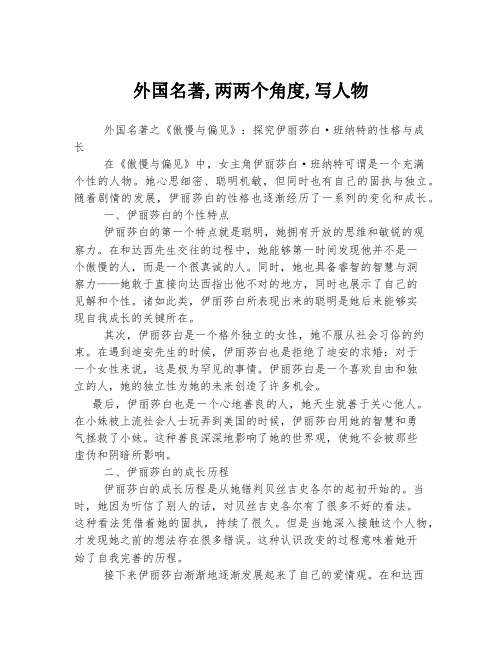
外国名著,两两个角度,写人物外国名著之《傲慢与偏见》:探究伊丽莎白·班纳特的性格与成长在《傲慢与偏见》中,女主角伊丽莎白·班纳特可谓是一个充满个性的人物。
她心思细密、聪明机敏,但同时也有自己的固执与独立。
随着剧情的发展,伊丽莎白的性格也逐渐经历了一系列的变化和成长。
一、伊丽莎白的个性特点伊丽莎白的第一个特点就是聪明,她拥有开放的思维和敏锐的观察力。
在和达西先生交往的过程中,她能够第一时间发现他并不是一个傲慢的人,而是一个很真诚的人。
同时,她也具备睿智的智慧与洞察力——她敢于直接向达西指出他不对的地方,同时也展示了自己的见解和个性。
诸如此类,伊丽莎白所表现出来的聪明是她后来能够实现自我成长的关键所在。
其次,伊丽莎白是一个格外独立的女性,她不服从社会习俗的约束。
在遇到迪安先生的时候,伊丽莎白也是拒绝了迪安的求婚:对于一个女性来说,这是极为罕见的事情。
伊丽莎白是一个喜欢自由和独立的人,她的独立性为她的未来创造了许多机会。
最后,伊丽莎白也是一个心地善良的人,她天生就善于关心他人。
在小妹被上流社会人士玩弄到美国的时候,伊丽莎白用她的智慧和勇气拯救了小妹。
这种善良深深地影响了她的世界观,使她不会被那些虚伪和阴暗所影响。
二、伊丽莎白的成长历程伊丽莎白的成长历程是从她错判贝丝吉史各尔的起初开始的。
当时,她因为听信了别人的话,对贝丝吉史各尔有了很多不好的看法。
这种看法凭借着她的固执,持续了很久。
但是当她深入接触这个人物,才发现她之前的想法存在很多错误。
这种认识改变的过程意味着她开始了自我完善的历程。
接下来伊丽莎白渐渐地逐渐发展起来了自己的爱情观。
在和达西先生的交往中,她学会了认识到自己在过去看法的种种偏见,并学会接受达西先生,相信他是一个值得信任且善良的人。
这是正面的自我成长。
最后,伊丽莎白从碰到崇拜达西先生的妹妹吉安娜·达西开始,意识到在一个爱情当中,敬意是十分重要的。
她劝吉安娜放弃自己对起床晚的习惯,鼓励她在精神和肉体都能够掌控的情况下创造自己的人生。
伊丽莎白与达西性格
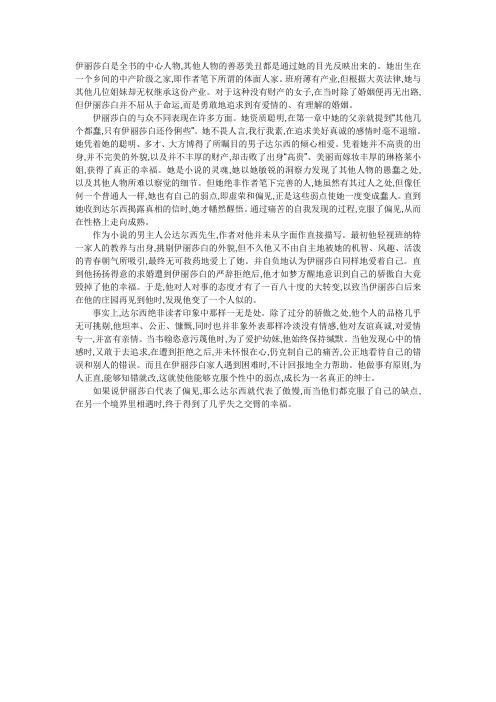
伊丽莎白是全书的中心人物,其他人物的善恶美丑都是通过她的目光反映出来的。
她出生在一个乡间的中产阶级之家,即作者笔下所谓的体面人家。
班府薄有产业,但根据大英法律,她与其他几位姐妹却无权继承这份产业。
对于这种没有财产的女子,在当时除了婚姻便再无出路,但伊丽莎白并不屈从于命运,而是勇敢地追求到有爱情的、有理解的婚姻。
伊丽莎白的与众不同表现在许多方面。
她资质聪明,在第一章中她的父亲就提到“其他几个都蠢,只有伊丽莎白还伶俐些”。
她不畏人言,我行我素,在追求美好真诚的感情时毫不退缩。
她凭着她的聪明、多才、大方博得了所瞩目的男子达尔西的倾心相爱。
凭着她并不高贵的出身,并不完美的外貌,以及并不丰厚的财产,却击败了出身“高贵”、美丽而嫁妆丰厚的琳格莱小姐,获得了真正的幸福。
她是小说的灵魂,她以她敏锐的洞察力发现了其他人物的愚蠢之处,以及其他人物所难以察觉的细节。
但她绝非作者笔下完善的人,她虽然有其过人之处,但像任何一个普通人一样,她也有自己的弱点,即虚荣和偏见,正是这些弱点使她一度变成蠢人。
直到她收到达尔西揭露真相的信时,她才幡然醒悟。
通过痛苦的自我发现的过程,克服了偏见,从而在性格上走向成熟。
作为小说的男主人公达尔西先生,作者对他并未从字面作直接描写。
最初他轻视班纳特一家人的教养与出身,挑剔伊丽莎白的外貌,但不久他又不由自主地被她的机智、风趣、活泼的青春朝气所吸引,最终无可救药地爱上了她。
并自负地认为伊丽莎白同样地爱着自己。
直到他扬扬得意的求婚遭到伊丽莎白的严辞拒绝后,他才如梦方醒地意识到自己的骄傲自大竟毁掉了他的幸福。
于是,他对人对事的态度才有了一百八十度的大转变,以致当伊丽莎白后来在他的庄园再见到他时,发现他变了一个人似的。
事实上,达尔西绝非读者印象中那样一无是处。
除了过分的骄傲之处,他个人的品格几乎无可挑剔,他坦率、公正、慷慨,同时也并非象外表那样冷淡没有情感,他对友谊真诚,对爱情专一,并富有亲情。
当韦翰恣意污蔑他时,为了爱护幼妹,他始终保持缄默。
探索人性的善恶:《傲慢与偏见》中的角色分析
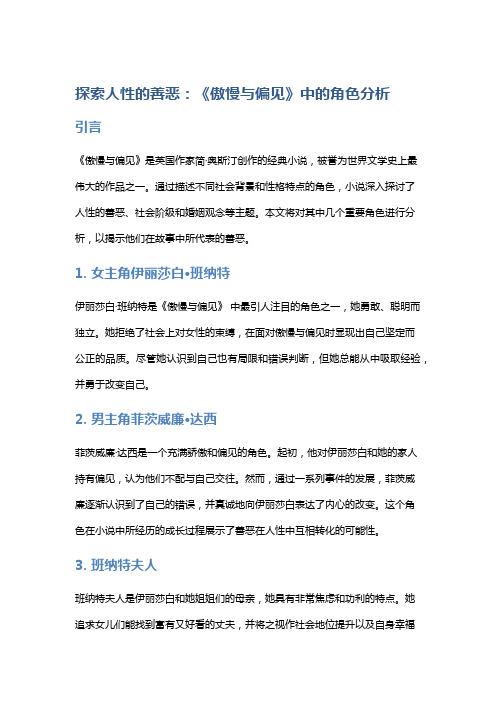
探索人性的善恶:《傲慢与偏见》中的角色分析引言《傲慢与偏见》是英国作家简·奥斯汀创作的经典小说,被誉为世界文学史上最伟大的作品之一。
通过描述不同社会背景和性格特点的角色,小说深入探讨了人性的善恶、社会阶级和婚姻观念等主题。
本文将对其中几个重要角色进行分析,以揭示他们在故事中所代表的善恶。
1. 女主角伊丽莎白·班纳特伊丽莎白·班纳特是《傲慢与偏见》中最引人注目的角色之一,她勇敢、聪明而独立。
她拒绝了社会上对女性的束缚,在面对傲慢与偏见时显现出自己坚定而公正的品质。
尽管她认识到自己也有局限和错误判断,但她总能从中吸取经验,并勇于改变自己。
2. 男主角菲茨威廉·达西菲茨威廉·达西是一个充满骄傲和偏见的角色。
起初,他对伊丽莎白和她的家人持有偏见,认为他们不配与自己交往。
然而,通过一系列事件的发展,菲茨威廉逐渐认识到了自己的错误,并真诚地向伊丽莎白表达了内心的改变。
这个角色在小说中所经历的成长过程展示了善恶在人性中互相转化的可能性。
3. 班纳特夫人班纳特夫人是伊丽莎白和她姐姐们的母亲,她具有非常焦虑和功利的特点。
她追求女儿们能找到富有又好看的丈夫,并将之视作社会地位提升以及自身幸福感受增加的方式。
然而,这种功利主义思想使得她疏忽了孩子们真正的情感需求,并导致了一系列不幸事件。
班纳特夫人所代表的善恶在于无视他人真实需求和以外貌、财富评价一个人。
4. 温斯顿先生温斯顿先生是小说中的反面角色之一,他代表了傲慢与虚伪。
作为一个出身高贵、富有的绅士,温斯顿常常鄙视那些社会地位较低的人,并对自身过高地评价。
然而,在与班纳特夫人结婚后不久,他展现出内心的真实面目:虚荣、轻薄、自私。
通过温斯顿,小说揭示了傲慢和虚伪在人性中隐藏的危险。
结论《傲慢与偏见》通过众多不同性格和社会背景的角色,深入探讨了人性中善恶两面的复杂性。
女主角伊丽莎白·班纳特代表了勇敢和公正,男主角菲茨威廉·达西则展示了自我认知和成长。
傲慢与偏见之伊丽莎白班内特解析

傲慢与偏见之伊丽莎白班内特解析伊丽莎白·班内特是简·奥斯汀的小说《傲慢与偏见》中的主要人物之一,她是一个聪明、机智且独立的女性,深受读者的喜爱。
本文将从伊丽莎白的性格特点、她与达西先生的关系以及她的成长和变化三个方面对伊丽莎白进行解析。
一. 伊丽莎白的性格特点伊丽莎白是一个独立、聪明并且具有独立见解的女性。
她并不容易受到他人的影响,有自己的判断力和决策能力。
当她第一次与达西先生相遇时,她对他有着强烈的偏见,认为他傲慢自大。
然而,随着故事的发展,她逐渐意识到自己的判断是错误的,开始重新审视达西先生和自己。
二. 伊丽莎白与达西先生的关系伊丽莎白和达西先生最初对彼此有着很大的偏见和误解。
达西先生因为社会地位高和自卑心理,总是给人一种傲慢和冷漠的形象。
而伊丽莎白则因为两人初次见面时达西对她的轻蔑态度而对他产生了傲慢的印象。
然而,在达西先生为她的姐姐解决了一桩麻烦后,伊丽莎白开始改变对他的印象。
通过一连串的事件,两人逐渐了解并欣赏对方的优点,最终彼此相爱。
三. 伊丽莎白的成长和变化伊丽莎白在小说中经历了很多成长和变化。
她意识到自己一开始对达西先生的偏见是错误的,并且愿意改变自己的看法。
在和达西先生交往的过程中,她学会了宽容和理解他人。
她也通过和自己姐姐简的对比,意识到了自己的傲慢和偏见,以及对他人的快速判断的错误。
总结:伊丽莎白·班内特是一个充满魅力和智慧的女性形象,她的性格特点和与达西先生的关系使得这部经典小说《傲慢与偏见》成为世人瞩目的文学作品。
通过她的经历和成长,读者可以从中获得对人性和情感的深入思考。
伊丽莎白的坚韧与勇气女性角色的分析
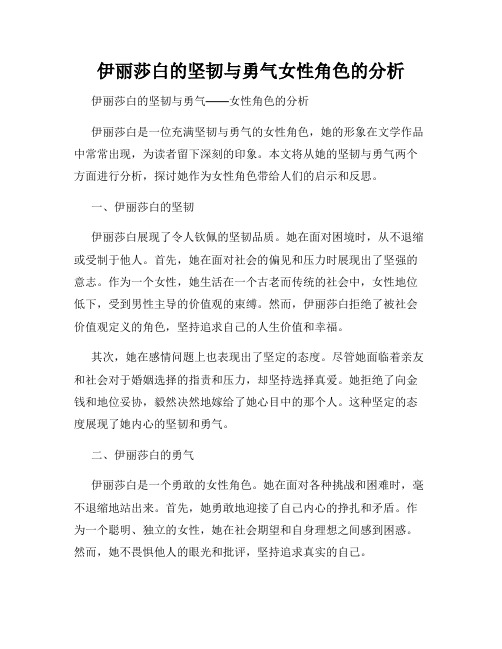
伊丽莎白的坚韧与勇气女性角色的分析伊丽莎白的坚韧与勇气——女性角色的分析伊丽莎白是一位充满坚韧与勇气的女性角色,她的形象在文学作品中常常出现,为读者留下深刻的印象。
本文将从她的坚韧与勇气两个方面进行分析,探讨她作为女性角色带给人们的启示和反思。
一、伊丽莎白的坚韧伊丽莎白展现了令人钦佩的坚韧品质。
她在面对困境时,从不退缩或受制于他人。
首先,她在面对社会的偏见和压力时展现出了坚强的意志。
作为一个女性,她生活在一个古老而传统的社会中,女性地位低下,受到男性主导的价值观的束缚。
然而,伊丽莎白拒绝了被社会价值观定义的角色,坚持追求自己的人生价值和幸福。
其次,她在感情问题上也表现出了坚定的态度。
尽管她面临着亲友和社会对于婚姻选择的指责和压力,却坚持选择真爱。
她拒绝了向金钱和地位妥协,毅然决然地嫁给了她心目中的那个人。
这种坚定的态度展现了她内心的坚韧和勇气。
二、伊丽莎白的勇气伊丽莎白是一个勇敢的女性角色。
她在面对各种挑战和困难时,毫不退缩地站出来。
首先,她勇敢地迎接了自己内心的挣扎和矛盾。
作为一个聪明、独立的女性,她在社会期望和自身理想之间感到困惑。
然而,她不畏惧他人的眼光和批评,坚持追求真实的自己。
其次,她在面对逆境时也表现出了勇敢的精神。
无论是家庭变故还是人生陷入低谷,伊丽莎白总是能够积极地应对,勇往直前。
她没有被困难打败,反而通过自己的努力和勇气克服了困境,最终实现了自己的目标。
三、对女性角色的启示和反思伊丽莎白的形象给我们带来了对女性角色的启示和反思。
首先,她告诉我们,女性并不是弱者,她们拥有和男性一样的勇气和坚韧。
女性应该拥抱自己的内心,坚持自己的追求,不被社会的偏见束缚。
其次,伊丽莎白的故事提醒我们,在追求真爱和幸福的道路上,我们需要保持勇气。
不论是面对外界的压力,还是自身的困惑,我们都应该有勇气追寻自己的幸福,并做出正确的选择。
最后,伊丽莎白的形象也提醒我们,面对困难和逆境时,要坚持乐观和积极。
伊丽莎白个性分析
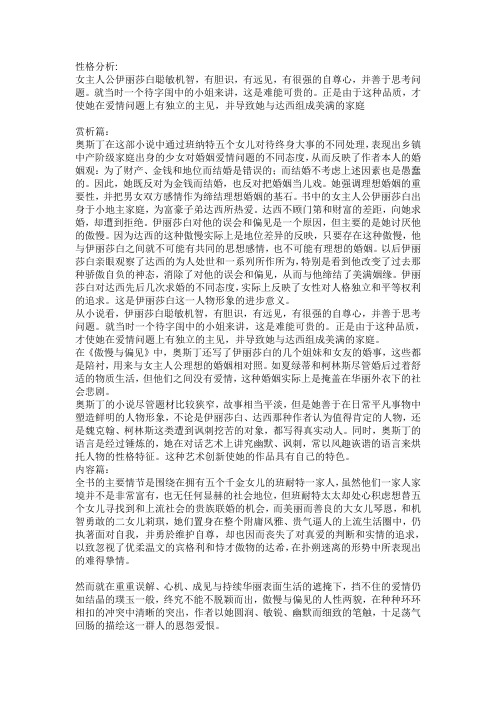
性格分析:女主人公伊丽莎白聪敏机智,有胆识,有远见,有很强的自尊心,并善于思考问题。
就当时一个待字闺中的小姐来讲,这是难能可贵的。
正是由于这种品质,才使她在爱情问题上有独立的主见,并导致她与达西组成美满的家庭赏析篇:奥斯丁在这部小说中通过班纳特五个女儿对待终身大事的不同处理,表现出乡镇中产阶级家庭出身的少女对婚姻爱情问题的不同态度,从而反映了作者本人的婚姻观:为了财产、金钱和地位而结婚是错误的;而结婚不考虑上述因素也是愚蠢的。
因此,她既反对为金钱而结婚,也反对把婚姻当儿戏。
她强调理想婚姻的重要性,并把男女双方感情作为缔结理想婚姻的基石。
书中的女主人公伊丽莎白出身于小地主家庭,为富豪子弟达西所热爱。
达西不顾门第和财富的差距,向她求婚,却遭到拒绝。
伊丽莎白对他的误会和偏见是一个原因,但主要的是她讨厌他的傲慢。
因为达西的这种傲慢实际上是地位差异的反映,只要存在这种傲慢,他与伊丽莎白之间就不可能有共同的思想感情,也不可能有理想的婚姻。
以后伊丽莎白亲眼观察了达西的为人处世和一系列所作所为,特别是看到他改变了过去那种骄傲自负的神态,消除了对他的误会和偏见,从而与他缔结了美满姻缘。
伊丽莎白对达西先后几次求婚的不同态度,实际上反映了女性对人格独立和平等权利的追求。
这是伊丽莎白这一人物形象的进步意义。
从小说看,伊丽莎白聪敏机智,有胆识,有远见,有很强的自尊心,并善于思考问题。
就当时一个待字闺中的小姐来讲,这是难能可贵的。
正是由于这种品质,才使她在爱情问题上有独立的主见,并导致她与达西组成美满的家庭。
在《傲慢与偏见》中,奥斯丁还写了伊丽莎白的几个姐妹和女友的婚事,这些都是陪衬,用来与女主人公理想的婚姻相对照。
如夏绿蒂和柯林斯尽管婚后过着舒适的物质生活,但他们之间没有爱情,这种婚姻实际上是掩盖在华丽外衣下的社会悲剧。
奥斯丁的小说尽管题材比较狭窄,故事相当平淡,但是她善于在日常平凡事物中塑造鲜明的人物形象,不论是伊丽莎白、达西那种作者认为值得肯定的人物,还是魏克翰、柯林斯这类遭到讽刺挖苦的对象,都写得真实动人。
- 1、下载文档前请自行甄别文档内容的完整性,平台不提供额外的编辑、内容补充、找答案等附加服务。
- 2、"仅部分预览"的文档,不可在线预览部分如存在完整性等问题,可反馈申请退款(可完整预览的文档不适用该条件!)。
- 3、如文档侵犯您的权益,请联系客服反馈,我们会尽快为您处理(人工客服工作时间:9:00-18:30)。
Elizabeth BennetThe second daughter in the Bennet family, and the most intelligent and quick-witted, Elizabeth is the protagonist of Pride and Prejudice and one of the most well-known female characters in English literature. Her admirable qualities are numerous—she is lovely, clever, and, in a novel defined by dialogue, she converses as brilliantly as anyone. Her honesty, virtue, and lively wit enable her to rise above the nonsense and bad behavior that pervade her class-bound and often spiteful society. Nevertheless, her sharp tongue and tendency to make hasty judgments often lead her astray; Pride and Prejudice is essentially the story of how she (and her true love, Darcy) overcome all obstacles—including their own personal failings—to find romantic happiness. Elizabeth must not only cope with a hopeless mother, a distant father, two badly behaved younger siblings, and several snobbish, antagonizing females, she must also overcome her own mistaken impressions of Darcy, which initially lead her to reject his proposals of marriage. Her charms are sufficient to keep him interested, fortunately, while she navigates familial and social turmoil. As she gradually comes to recognize the nobility of Darcy’s character, she realizes the error of her initial prejudice against him.性格伊丽莎白宽松而悠闲的生活环境造就了她聪明活泼、机智幽默、落落大方的性格。
她拥有敏锐的观察力和判断力、强烈的自信心、精神上的优越意识和迷人的反抗性格,她敢作敢为,以自己的行动向专讲体面的礼教挑战;但相比于夏洛蒂·勃朗特的《简·爱》,奥斯汀强调的是女性实现自我价值,这种女性意识中少有的非功利性特征。
对于奥斯汀来说,重建健全的女性主体意识远远比争取女性的平等社会地位重要。
她并不强调女性一定要取得和男性一样的社会地位,甚至不否定社会中男性角色和女性角色的区别,她重视的是女性自身的发展,是女性的自我完善,强调女性找回自我。
婚恋观在伊丽莎白看来,没有爱情就千万不要结婚,她对待爱情和婚姻的态度理智得让人吃惊,她向往的婚姻固然以爱情为前提,但也决不能离开经济需要。
虽然她最初对有着英俊外表和良好口才的威汉姆充满好感,并一度打定主意要俘获他的心,但在舅妈的劝说下,她很快理智地退出,有效地阻止了自己和威汉姆进一步坠入爱河,原因只有一个:双方都没有什么财产。
伊丽莎白总是处于传统父权文化观念中女性被选择的弱势地位,物质爱情双丰收的婚姻不过是提高她地位的一个手段和证明她才智的一个方法。
1、女主人公伊丽莎白生活的社会环境《傲慢与偏见》所描绘的18世纪末19世纪初的英国女性不论在经济、社会还是家庭地位上都依附于男性,社会等级制度森严,婚姻讲究门当户对。
像伊丽莎白这样一个中产阶级出身但又财产微薄的知识女性,要想获得一种体面的生活和地位,唯一的途径就是嫁给一个好男人。
正如奥斯丁所写:"一个有钱的单身汉,每年有四五千镑的收入真是女儿们的福气!''"总之,婚姻是人们寻求经济保障及社会地位的途径。
伊丽莎白的堂兄柯林斯深知这一点所以经济殷实但庸俗不堪的他在向才貌出众的伊丽莎白求婚时,认为自己这是便宜了伊丽莎白;伊丽莎白的好友夏绿蒂也深知这一点,所以在柯林斯向好友伊丽莎白求婚未果转而向自己求婚时欣然应允。
2、伊丽莎白的爱情婚姻之路全书的中心人物伊丽莎白是一个聪慧、坦率、思维敏捷、风趣活泼而有教养的小姐。
她的爱情是从在麦里屯碰到民兵自卫团的军官韦翰开始的,伊丽莎白立刻被韦翰一副"讨人喜欢"的仪表迷住了。
韦翰跟她一见如故,滔滔不绝地表白自己中伤达西先生说道:"老实说,除了在尼日斐花园以外,我到附近任何人家去都会这样说。
哈福德郡根本就没有人喜欢他,他那副傲慢的气派哪一个见了都讨厌。
你绝不会听到人家说他一句好话。
"这些话破绽百出但聪明过人的伊丽莎白竟然毫无察觉,被韦翰牵着鼻子走完全被爱情冲昏了头脑。
她为他抱屈,心里责怪达西,"怎么竞如此对待像你这样的一个青年,光凭你一副脸蛋儿人家准知道你是个和蔼可亲的人"。
她与韦翰分手时"脑子里只想到他一个人"。
总之,优秀的伊丽莎白现在成了被人嘲讽的"愚蠢人"了。
这正是恋爱中的伊丽莎白的真实写照。
由于听信了丰翰的谗言,加之伊丽莎白获悉促使姐姐吉英和彬格莱先生分离的主使人竟是达西,对达西的愤恨和对吉英幸福不可得的心痛完全控制了伊丽莎白的头脑她断定是达西的门户偏见和想把自己妹妹许配给彬格莱先生的自私想法导致了吉英和彬格莱先生分手。
她深恶痛觉地指责达西毁了自己姐姐一生的幸福,剥夺了韦翰幸福生活的权利。
达西的傲慢基于他不屈不挠的性格,由于他出言伤害伊丽莎白,引起她的偏见;也正由于伊丽莎白的自爱才产生了她对达西的偏见,傲慢与偏见都达到了最高峰。
达西给伊丽莎白的一封信促使伊丽莎白的思想发生了重大变化。
达西在信中坦承了自己之所以拆散吉英和彬格莱是因为他误认为吉英对彬格莱并无真爱;而韦翰的所作所为又是那么地令人不齿,甚至想诱使达西的妹妹和他一起私奔。
这信件在伊丽莎白心中宛如一枚重型炸弹,炸毁了她先前心中的种种障碍和芥蒂。
伊丽莎白重新认真、冷静地审视了自己,第一次意识到"自己以往未免太盲目,太偏心,对人存在偏见而且不近情理",正是达西和韦翰对自己态度的不同促成了自己的偏见和无知,长期遮蔽双眼蒙蔽心智的薄纱终于被揭除新的正确的自我认识帮助伊丽莎白走出误区,消除了对达西的偏见,而达西也因伊丽莎白激昂的谴责产生了极大的震憾对自己从前的言行举止进行了新的认识和改造。
再次出现在伊丽莎白面前的达西与求婚前的达西大相径庭。
伊丽莎白看出他原来是个性格很柔顺的人,于是尊敬之外又添上了几分亲切,爱慕之心悄无声息地产生了。
傲慢变成了谦逊,偏见变成了亲切。
伊丽莎白的妹妹丽迪雅和韦约翰的私奔依仗达西的资助得以平息,更使两人在感情上越走越近,浓浓的茶香中渗出甜蜜的滋味。
咖苔琳夫人狂妄愚蠢的到访不仅没能阻挡伊丽莎白与达西结亲的趋势。
反而像爱情的催化剂大大激发了西第二次求婚的勇气。
性格上的共同之处和对方对性格相互欣赏是两人最终走进婚姻殿堂、走向理性幸福的一坚实基础傲慢与偏见化为浓浓的柔情蜜意。
有情人终成眷属。
From Realism to Idealism ━Views on Jane Austen’s Att itude towards Marriage in Pride and Prejudice从现实到理想━论简·奥斯丁在《傲慢与偏见》中的婚姻观Elizabeth Bennet's Ideal Marriage and Jane Austen's Views of Marriage——Charact eristic of Elizabeth Bennet in Pride and PrejudiceOutlineThesis statement: This paper intends to show the ideal marriage of Elizabeth Bennet's and Jane Austen's Views of Marriage by analysis Elizabeth Bennet's character .IntroductionⅠ. The shape of Elizabeth Bennet’s cocharacterA. The social environmentB. Elizabeth Bennet’s marriageC. The meaning of Elizabeth Bennet’s marriageⅡ. Jane Austen's Views of marriageA. The experience of Jane Austen's marriageB. Jane Austen's ideal marriageⅢ. Conclusion : Jane Austen's Views of successful marriage with the guidance of Elizabeth Bennet's character .傲慢与偏见中伊丽莎白的性格分析关键词:傲慢与偏见伊丽莎白班内特性格分析中国论文职称论文The Character of Elizabeth Bennet in Pride and Prejudice"Pride and Prejudice" the novel by Jane Austin has a main theme of romance, but many other s ub themes are present. I intend to demonstrate that Elizabeth Bennet is an interesting characterin the book.The man plot of the story revolves around Elizabeth (or Eliza) Bennet, who belongs to a family of five sisters, and her relationship with eligible bachelor Mr Darcy. How ever, "Pride and Prejudic e" is a very complex novel, with many different subplots going on. One of these is the relationsh ip between Eliza's older sister Jane, and Bingley, Darcy's friend. There are many misunderstandin gs within their courtship which have an important role in the plot. Elizabeth's father and mother p lay a part, as do her relations, friends and acquaintances. In the story, Eliza hates Darcy at first, thinking him proud, but overcomes her prejudice and comes round to loving him in the end, an d the two marry, as do Jane and Bingley. Another marriage is between Lydia, Elizabeth's younge r sister, and Wickham, a man who Eliza was initially interested in. However, his true character c omes to light, and his marriage proves to be far from uneventful.One reason why Elizabeth proves to be a very interesting character is her close friendship with her older sister Jane. The pair know each other very well, and they both feel a need to confide in one another due to the less that charming personality traits of the rest of their family. They ar e the only sensible ones if the household. Due to their constant contact, that are able to tell each other's moods with great ease, Eliza especially. When Jane returns from seeing Bingley "Elizab eth instantly read her feelings", so we know that they spend a lot of time in each other's company.Elizabeth obviously cares deeply about Jane, because when the later becomes ill while at Nether field, Darcy's home, Eliza takes it upon herself to walk three miles through the mu d to visit her. This greatly surprises the Netherfield party, but Eliza appears unconcerned. She mostly stays by Jane's bedside during the visit, preferring her company to the superciliousness of Miss Bingley a nd Hurst. Jane becomes very fond of Mr Bingley, and she is quite upset when she hears of his departure. It is only Elizabeth that she confides in, and that tries to cheer her up. Her spirits rais e for a short time, but when the letter arrives informing her that the Netherfield party intend to st ay in London for the winter, she becomes downhearted once more. She attempt to conceal heremotions from Elizabeth, but to no avail"Elizabeth looked at her sister with incredulous solicitude, but said nothing."You doubt me," cried Jane, slightly colouring"Whilst visiting Lady Catherine de Bourgh, Elizabeth learns that Darcy discouraged Bingley from c ontinuing his relationship with Jane, and this sets Elizabeth in a flurry of emotions. She feels a mixture of hatred for Darcy and anxiety and pity for her s ister, "The agitation and tears which th e subject occasioned...". When later, Darcy confesses his love for her, she holds no bars in expr essing her opinion of his interference, "do you think consideration would tempt me to accept the man who has been the means of ruining, perhaps forever, the happiness of a beloved sister?" When Darcy explains his actions, Elizabeth can't bring herself to tell Jane about it, and so feels "anxiety on Jane's behalf". She "dared not relate" the information.When she hears news of the family crisis (Lydia's elopement with Wickham) while visiting Pembe rly, Darcy's residence, Elizabeth is desperate to return home, and the two have a tearful reunion., "she affectionately embraced her, whilst tears filled the eyes of both...". The conversations betwe en the them greatly help to ease each other's fears over the elopement, and, as always, they ar e there for each other. When Bingley returns, Elizabeth is ecstatic for Jane, and when their enga gement is announced "Elizabeth's congratulations were given with a sincerity, a warmth, a delight, which words could poorly express". 本文来自(英语论文大百科)When Elizabeth herself becomes engaged to Darcy, Jane is the first person she tells. "My sole d ependence was on you; I am sure nobody else will believe me if you do not". Jane is, of cours e, happy for Elizabeth, yet wonders on her change of opinion on Darcy. Here follows a touching a humorous scene in which Eliza and Darcy's relationship is discussed openly. Elizabeth and Ja ne share a very close friendship, and the way that Elizabeth gently teases Jane, and her huge a ffection for her sister make Elizabeth seem fascinating and adds great value to the character.Other than Elizabeth, Darcy is probably the most crucial character, and their changing relationshi p is another interesting aspect of the novel. When the pair first meet, they do not get on well. E lizabeth takes a particular disliking to him after his haughty dismissal of her when they both atte nded a ball at Netherfield. "She is tolerable; but not handsome enough to tempt me". He is cons idered in low regard by all who attended, "Everybody is disgusted by his pride". From this point on, she finds several more reasons to dislike him, including her belief that he treated Wickham b adly, and that he successfully discouraged his friend Bingley from continuing his relationship with Jane. Darcy shocks her by proposing, and despite her flat refusal, "she could not be insensible to the compliment of such a man's affection". When Darcy offers an explanation and an apology for all his actions via a letter, it is initially rejected. However she later begins to feel guilty over her harsh treatment of him, and regrets her rashness. "She grew absolutely ashamed of herself. "How despicably i have acted! How humiliating is this discovery! Till this m oment i never knew myself"".She now feels nervous about seeing Darcy again, and only agrees to visit his estate when it is confirmed that he will not be there. While touring the house she is surprised to hear that the ho usekeeper believes Darcy to be a fine master, and has "never had a cross work from him in my life, and I have known him ever since he was four years old". Much to Elizabeth's horror, she encounters Darcy whilst walking in the grounds, and discovers he arrived home early. When he r equests that she might meet his sister she is "flattered and pleased", and greatly surprised by hi s sudden kindness. "Never in her life had she seen his manners so dignified...". Darcy lovingly d efends her from abuse from Miss Bingley, who hasn't given up hope of winning Darcy's affection, showing that he isn't ashamed of his feelings for her, and no longer makes an attempt to hide them. Soon after, Darcy turns up at Loungbourne, where the Bennet family live. After a lot of aw kwardness, he proposes again, and this time she accepts. They talk over their past relationship, clearing many misunderstandings. Darcy also tells Elizabeth that he has appologised to Bingley f or his unhelpful advice, and that he is now much better informed.Elizabeth initially feels prejudice against Darcy because of his "abominable pride". However, she gradually overcomes her preconceptions, and comes to realise that he isn't what she imagined hi m to be. He becomes the perfect gentlemen in her estimation and their solid relationship looks apromising base for marriage.The character of Elizabeth is an fascinating one, and her personality only adds to the reader's in terest in her, because she has many different sides and constantly changes opinions and ideas. Towards the beginning of the book we are given many different descriptions of Elizabeth, ranging from "She had a lively, cheerful disposition, which delighted in anything ridiculous", to "hardly a good feature in her face...". We can see that different people has varying views on her. However, through the course of the book we come to make our own opinion, and I came to know her as being spontaneous, high-spirited, intelligent and above all a complex young woman.Eliza tends to be a better judge of character than her sister Jane, who sees the good in everyb ody. However, she can be blinded by prejudice, as her encounters with Darcy and Wickham prov e. She is very determined, shown by the way she walks through the mud to see Jane, and in h er treatment of Darcy when she believes him to have done wrong. She is greatly embarrassed b y her family, and sees both the "impropriety" of her father's behavior, and the less than perfect s ocial habits of her mother. She is often the voice of reason in her family, an d feels responsible f or seeing that her family don't show themselves up in public, often fighting a losing battle.Another intriguing aspect of Elizabeth's personality is her talent for observing people. Throughout the novel she watches people in order to find out more about their personality, and this is obvio usly something that she enjoys. She is describes as having a "quickness of observation", and sh e finds that "intricate characters are the most interesting". While staying at Netherfield she is "am used in attending to what passed between Darcy and his companion". She tells Darcy whilst dan cing with him at the ball that she wishes to discover more about his personality. "The illustration of your character ...I am trying to make it out...". She proves to be genuinely intuitive, but in Mr Darcy's case seems at first to have a blind spot. For all these reasons the personality of Elizab eth greatly adds to the reader's understanding and enjoyment of the novel.In conclusion, Elizabeth makes the story what it is. Without such an intriguing main character, t he novel would be nowhere near as interesting. She constantly develops, and this means out int erest in her is held. Her misfortune in terms of family and relationships induces pity, as well as making her seem more true to life. Her observations lead us through the story, meaning that we see everything through her eyes, and her intelligence and wit mean we enjoy her commentary. She is by far the most fascinating character in the book, and I believe all the reasons mentionedmake her a first rate main character.。
